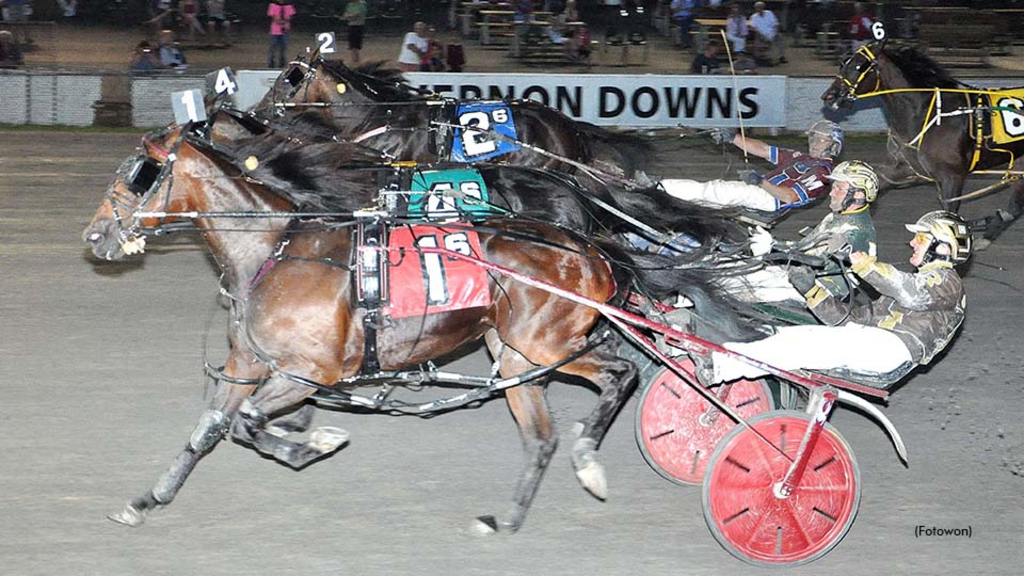Vernon Downs Under Quarantine With EHV-1 Cases

Vernon Downs announced on Thursday (May 5) that the barn area is closed and all horses stabled there are under quarantine until further notice due to two equine deaths.
Once management was notified of the first death on Monday, the horse was transported to Cornell University Equine hospital for necropsy and the barn area was locked down.
The results of that necropsy have confirmed that Equine Herpesvirus 1 (EHV-1) was the cause of death.
A second horse died Tuesday and a third was transported to Cornell while still alive on Wednesday. Testing is pending on those horses.
Out of an abundance of caution, live harness racing for Friday, May 6 and Saturday, May 7 and this week's qualifiers at Vernon Downs have been cancelled, pending regulatory approval.
The NY State Gaming Commission and NY Department of Agriculture are engaged and advising Vernon staff. A separate, informational release from those offices with greater detail on the events and the virus itself follows.
Further details will be made public as they are available.
Equine Medical Advisory Re: Equine Herpes Virus At Vernon Downs
Three suspected cases of Equine Herpes Virus Type 1 (EHV-1) have been identified at Vernon Downs Racetrack over the past three days. EHV-1 is a common viral infection that can cause respiratory disease, abortion in pregnant mares and neurological disease. The virus does not affect people.
Out of an abundance of caution, Vernon Downs has canceled live racing for May 6 and May 7.
The New York State Gaming Commission and the New York State Department of Agriculture and Markets are both closely monitoring the situation. Vernon Downs management has quarantined potentially exposed horses and closed the stable area.
On May 2, 2022, the first case was found deceased in its stall in Barn 18 at Vernon Downs. On May 3, 2022, another horse in the same barn developed neurologic symptoms and was humanely euthanized. Both horses were sent to Cornell University for a necropsy to determine the exact cause of death. On May 4, 2022, a third horse from the same barn exhibited neurologic symptoms and was sent to the Cornell University Hospital for Animals for examination and treatment. On May 4, 2022 the Cornell University Animal Health Diagnostic Center reported that a nasal/pharyngeal swab from the second horse tested positive for EHV-1.
All three affected horses were stabled in Barn 18 at Vernon Downs and were trained by the same trainer. Vernon Downs security has quarantined all horses in Barn 18. Appropriate biosecurity measures will remain in place for 21 days after the resolution of clinical signs in all affected horses. No horses are allowed to enter or leave the stable area at this time. Clinically normal horses in Barn 18 will be allowed to train after all other horses have finished training, but no horses stabled in Barn 18 will be allowed to enter to race until they have cleared quarantine.
Staff from the Commission and the Department of Agriculture and Markets are working with the trainer and racetrack operators to identify and locate additional horses that may have been in contact with the affected horses.
EHV-1 may be spread by close contact with infected horses or by contact with objects contaminated by an infected horse (e.g., tack or grooming equipment, water and feed buckets, clothing, footwear of stable employees, etc.).
Trainers, owners, and caretakers who believe their horses may have been potentially exposed to EHV-1 should follow these guidelines:
- Check and record your horses’ temperature twice a day for 10 days. The incubation period for EHV-1 may range from 24 hours to a week or longer.
- Look for clinical signs of illness, including fever (rectal temp greater than 101.5 F), coughing, nasal discharge, depression, incoordination, or wobbly gait, dribbling urine, poor tail tone or difficulty in standing. If any of these signs are seen, call your veterinarian immediately.
- There are multiple tests for EHV-1 infection. At this time, the preferred test for EHV-1 is a PCR test performed on nasal swab secretions or blood samples. However, the decision to test a horse that is not showing clinical signs of disease should not be taken lightly. Due to the ubiquitous nature of EHV-1, many horses will test positive for presence of the virus and not develop the disease. Clinically normal horses that test positive for EHV-1 will be placed in quarantine for up to 21 days.
- Rigorous biosecurity measures should be followed throughout the quarantine period.
The quarantine procedures are subject to change as both the Department of Agriculture and Markets and the Gaming Commission continue to monitor the situation at Vernon Downs closely and may modify restrictions based on conditions on-site and/or new information.
For more information on EHV-1 and details for quarantine procedures, see the American Association of Equine Practitioner's website or the USDA APHIS' brochure on the virus.
(With files from Vernon Downs and New York State Gaming Commission)

